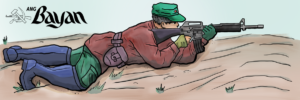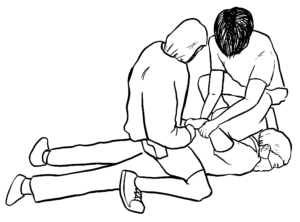How the AFP cancels democracy

Outright campaigning by personnel of the Armed Forces of the Philippines (AFP) in favor of Ferdinand Marcos Jr. as president were reported in various parts of the country during the recently concluded elections. Military generals are agog over the return to power of the Marcos family which in the past gave them broad powers and the license to attack with impunity.
If the AFP was satiated under Duterte’s tyranny, they are set to be further indulged by Marcos Jr. with monstrous powers over the people’s money and the nation’s politics.
Bursting with funds and position
The AFP, together with the Philippine Constabulary (police) which it led, served as the pillar of Marcos Sr.’s martial law. On Marcos Sr.’s orders, they arbitrarily arrested and detained people who went against the government or were suspected as subversives.
To make the AFP serve as a solid foundation to his rule, Marcos Sr. increased its manpower from 60,000 in 1972 to 250,000 in a short period of three years. The dictator poured funds from ₱880 million in 1972 to ₱4 billion in 1976. Among Southeast Asian countries, military spending under the Marcos dictatorship was the largest from 1971 to 1980 despite the Philippines having the lowest increase rate in the gross national product during the same period.
Despite Marcos Sr.’s ouster, the military maintained its power in the succeeding regimes. Not less than 15 Marcos generals were appointed in the Corazon Aquino government. During his presidency, former PC chief Gen. Fidel V. Ramos enacted the AFP “modernization” providing for allocation of billions of pesos. This was expanded further under the Aquino II regime with funds of more than $40 billion until 2028.
From the outset, the gargantuan military funds serve as generals’ milking cow. This year, the military and police’s combined budget is more than ₱470 billion, constituting 9.4% of the national budget, more than the budget allocation for public health. There are more soldiers than health workers.
It was also under martial law that the AFP gained vast powers in running the government. Beyond their primary task of defending the country’s sovereignty, AFP officials became managers of industries related to the military and public corporations, and even as representatives in foreign relations.
Contrary to the principle of civilian supremacy, generals have been eroding democracy and over the past decades have dominated government. They have been influencing key decisions and policies of the government, holding sensitive positions in the bureaucracy, and playing a role in the change of power from one regime to the next.
Favorite generals
In monopolizing power, Marcos Sr. trusted only his inner circle of generals from Ilocos which included Gen. Fabian Ver and General Ramos.
Every president since have pampered their own favored group of generals who held wide influence despite retirement. Under Rodrigo Duterte, the military and police gained the greatest powers. In 2017, Duterte outrightly declared that he will appoint former officials to his cabinet to “complete his junta” and “become managers” of government in order to appease them and dissuade them from mounting a coup d’etat. These generals control Duterte’s government through the National Task Force-Elcac.
Like Marcos Sr., Duterte appointed a number of military and police officers. More than 70 held positions in national agencies, apart from the hundreds of former soldiers and police assigned in regional or provincial agencies, or elected to local government. Meanwhile, the so-called Davao Generals were assigned to key positions in different parts of the country.
The Duterte regime is the most militarized in the country’s history. It outdid the Marcos Sr. regime, who, despite his dictatorship, maintained a semblance of civilian rule by appointing non-military personnel with experience and expertise in the fields of education, labor, agriculture and others.
Whether during the Marcos Sr. dictatorship or under Duterte, favorite generals were pampered leading to factions of politically ambitious generals. There is deepening distrust among rank-and-file officers and the emerging patriotic and democratic elements.



